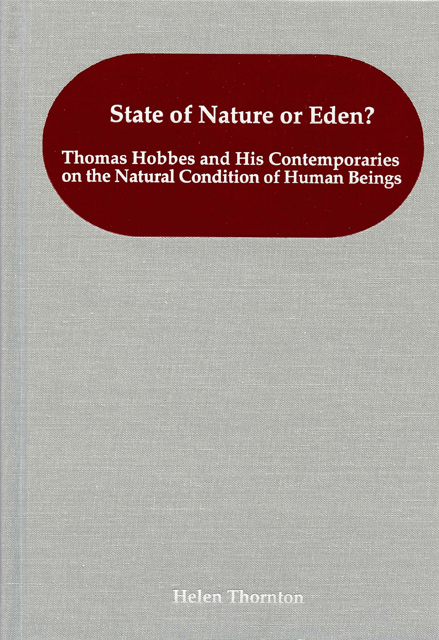 State of Nature or Eden?
State of Nature or Eden? Chapter Four - The Right and Law of Nature
Published online by Cambridge University Press: 21 June 2023
Summary
‘And the LORD God commanded the man, saying, Of every tree of the garden thou mayest freely eat: But of the tree of the knowledge of good and evil, thou shalt not eat of it: for in the day that thou eatest thereof thou shalt surely die’. (Genesis II.16–17)
HOBBES AND NATURAL RIGHT
Hobbes’ state of nature was a condition of war. This condition of hostility was caused by disagreement over good and evil, natural equality, and natural unsociability, but it was also a result of the right of all men to all things. Hobbes began his inquiry into natural justice with a theological assumption, namely that God had given the earth to human beings in common. In the Epistle Dedicatory of De Cive Hobbes informed his readers that when he began to think about natural justice he was
alerted by the very name of justice (by which is meant a constant will to give every man his right) to ask first how it is that anyone ever spoke of something as his own rather than another’s; and when it was clear that it did not originate in nature but in human agreement (for human beings have distributed what nature had placed in common), I was led from there to another question, namely for whose benefit and under what necessity, when all things belonged to all men, they preferred that each man should have things that belonged to himself alone. And I saw that war and every kind of calamity must necessarily follow from community in things, as men came into violent conflict over their use; a thing all seek by nature to avoid.
Hobbes went on to say that it was for this reason that he obtained ‘two absolutely certain postulates of human nature: one, the postulate of human greed, by which each man insists upon his own private use of common property; the other, the postulate of natural reason, by which each man strives to avoid violent death as the supreme evil in nature’. Hobbes’ description of the right of nature was a combination of these two postulates of human nature—passion and reason.
- Type
- Chapter
- Information
- State of Nature or Eden?Thomas Hobbes and his Contemporaries on the Natural Condition of Human Beings, pp. 101 - 132Publisher: Boydell & BrewerPrint publication year: 2005
